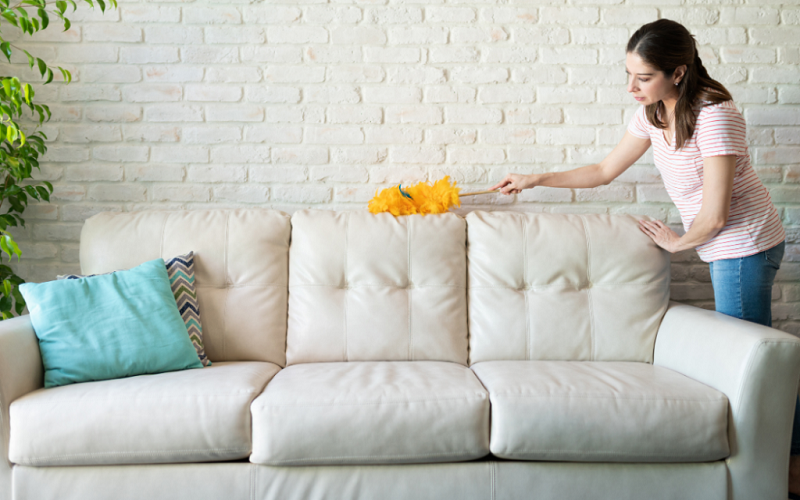
A clean sofa is necessary to keep your home comfortable and healthy. Over time, sofas can harbour bacteria, allergies, dust, and other particles, providing undiscovered risks to your health and well-beingwell-being. It is essential to comprehend these hazards and know how to prevent them. This essay will look into the potential risks associated with an unclean sofa and offer maintenance advice.
The Hidden Dangers
Allergens and Triggers for Asthma
Numerous allergens, such as pollen, pet dander, and dust mites, can gather on sofas. These allergens have the potential to cause allergic responses and asthma episodes, particularly among those who are susceptible. Prolonged contact with these allergens trapped in your sofa might aggravate symptoms, including sneezing, coughing, and itchy eyes.
Development of Bacteria
Warm, damp surroundings are ideal for bacteria to grow, and a dirty sofa may serve as the ideal breeding ground. Sweat and spills can permeate into the material, promoting the growth of microorganisms. If left untreated, common bacteria like Staphylococcus and E. coli can lead to skin infections and other health problems.
Mildew and Mould
Mould and mildew are major hazards in humid regions like Singapore. If a filthy couch stays wet or is exposed to high humidity levels, mould and mildew can grow on it very quickly. Spores released into the air by these fungus can result in allergic responses, headaches, and respiratory issues.
Unpleasant Odours
Spills, pet hair, accumulated filth, and food crumbs might cause bad odours coming from your sofa. These odours can make your house seem less welcoming, and they can be hard to get rid of without thorough cleaning.
Infestation of Pests
Pests like fleas, bedbugs, and dust mites can be drawn to a dirty sofa. These bugs may lead to a more serious infestation in your house and cause discomfort and health issues. Maintaining your sofa on a regular basis will help keep bugs from making it their home.
Ways to Prevent These Dangers
Frequent Vacuuming
Hoover your sofa often to remove allergies and surface grime. Use an upholstery attachment to remove dirt buildup in seams and cracks. Vacuuming at least once a week can greatly decrease the accumulation of dangerous particles.
Quick Spot Cleaning
Spills and stains have to be cleaned up immediately to prevent them from seeping into the fabric and growing mould and germs. Once spills have been blotted, treat the area with an appropriate couch cleaner. To ensure cleaning solutions don’t harm the fabric, always test them on a tiny, discrete area first.
Deep Cleaning
Plan to have your sofa thoroughly cleaned at least twice a year. To get rid of allergies, germs, and deep-seated grime, you can use steam cleaning or employ a professional couch cleaner. In addition to making your sofa seem better, deep cleaning promotes a healthier living space.
Adequate Ventilation
Adequate ventilation in your living area will lower humidity and stop the spread of mould. If necessary, use dehumidifiers—especially in humid climates—to maintain dry, clean air.
Couch Covers
In order to shield your couch from spills, pet hair, and grime, think about utilising machine-washable coverings. Sofa covers offer an additional layer of protection for your furniture and are simple to clean. They can be taken off and cleaned on a regular basis.
Expert Inspection
If you think there may be a pest problem on your couch or if there are lingering smells that cleaning won’t seem to go away, get your sofa checked out by an expert. Professional services can offer specialised therapies to successfully address these problems.
Conclusion
A clean sofa is essential to a healthy household. The unspoken risks associated with a filthy sofa might affect your comfort and well-being. These risks include mould, germs, allergies, and bugs. You can prevent these concerns and make sure your sofa continues to be a secure and comfortable place to unwind by following regular cleaning schedules, applying quick spot treatment, and doing occasional deep cleaning. Proactively maintaining your couch not only extends the life of your furniture but also improves the general health of your home.
